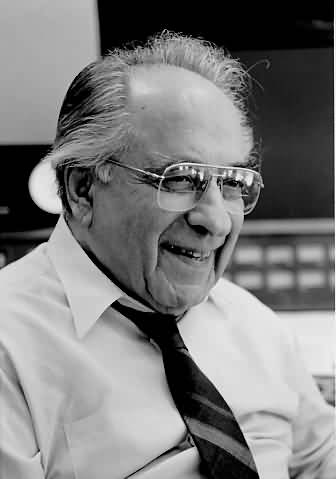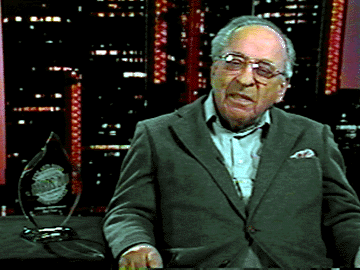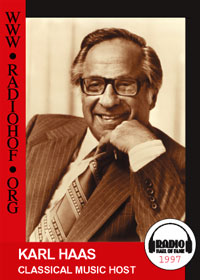 KH
KH KH: I have never worried about aspects.
I do what I love doing and hope that there are people out there who catch
fire — and judging by the mail and by personal experiences,
there are. I just played in Fairbanks, Alaska, and afterwards a young
Air Force Lieutenant came to see me. He listens through the Armed
Forces Network and serves on the outermost of the Aleutian Islands which
borders on Siberia. He came two thousand miles by plane to listen to
the concert. And then, of course, there are the truck drivers that
prompted the bumper sticker contest. I’m happy to say it lays to rest
the fallacy that only people who have money and an education enjoy this
kind of music. I have never heard a bigger piece of baloney in my
life! If music doesn’t belong to everybody, I don’t know what does.
I’m not speaking of the social element, I mean society associated with symphony
orchestras, who go to be seen.
KH: I have never worried about aspects.
I do what I love doing and hope that there are people out there who catch
fire — and judging by the mail and by personal experiences,
there are. I just played in Fairbanks, Alaska, and afterwards a young
Air Force Lieutenant came to see me. He listens through the Armed
Forces Network and serves on the outermost of the Aleutian Islands which
borders on Siberia. He came two thousand miles by plane to listen to
the concert. And then, of course, there are the truck drivers that
prompted the bumper sticker contest. I’m happy to say it lays to rest
the fallacy that only people who have money and an education enjoy this
kind of music. I have never heard a bigger piece of baloney in my
life! If music doesn’t belong to everybody, I don’t know what does.
I’m not speaking of the social element, I mean society associated with symphony
orchestras, who go to be seen. KH: Oh, there’ll always be room for outstanding
people. It’s difficult, of course. It’s much easier to become
a violinist than a bassoonist because there are only two bassoons in the orchestra,
and there are twenty violins in the orchestra. I remember having guest
conducted the Detroit Symphony, for instance. At the rehearsal we
did the Meistersinger Overture and
there’s a wonderful three-layer theme that Wagner ingeniously interweaves
at the end. Personally it’s always been my habit to turn to the tuba
and the celli and the double basses, because they carry the main theme at
that point, around which the other subsidiary themes are woven. So
I hear this magnificent tuba sound, and I looked and I couldn’t see anybody
behind the stand. All of a sudden, on either side of the stand I see the cheeks
puffing out. It turned out to be a young girl who played the tuba.
She was engaged because the regular tuba player couldn’t play, so she was
a substitute. Wonderful musician! I went back after the rehearsal
to see her and I said, “You know, I couldn’t see you; I could only hear you,
and I was crazy about what I heard.” She said, “If only I could get
a job. All I do is substituting.” About three months later or
so, I conducted in Saginaw and I didn’t have to look; there was that same
sound. The same girl again was substituting. Now here is a young
black girl, incidentally, which is neither here nor there, who simply cannot
find a job because, as you know, there is only one tuba in each orchestra.
KH: Oh, there’ll always be room for outstanding
people. It’s difficult, of course. It’s much easier to become
a violinist than a bassoonist because there are only two bassoons in the orchestra,
and there are twenty violins in the orchestra. I remember having guest
conducted the Detroit Symphony, for instance. At the rehearsal we
did the Meistersinger Overture and
there’s a wonderful three-layer theme that Wagner ingeniously interweaves
at the end. Personally it’s always been my habit to turn to the tuba
and the celli and the double basses, because they carry the main theme at
that point, around which the other subsidiary themes are woven. So
I hear this magnificent tuba sound, and I looked and I couldn’t see anybody
behind the stand. All of a sudden, on either side of the stand I see the cheeks
puffing out. It turned out to be a young girl who played the tuba.
She was engaged because the regular tuba player couldn’t play, so she was
a substitute. Wonderful musician! I went back after the rehearsal
to see her and I said, “You know, I couldn’t see you; I could only hear you,
and I was crazy about what I heard.” She said, “If only I could get
a job. All I do is substituting.” About three months later or
so, I conducted in Saginaw and I didn’t have to look; there was that same
sound. The same girl again was substituting. Now here is a young
black girl, incidentally, which is neither here nor there, who simply cannot
find a job because, as you know, there is only one tuba in each orchestra. KH: For instance, yesterday I did a program here
at the high school, and there were three hundred students there. I
had my trepidations if they would listen to me, but they stayed to the end
and they cheered, and they want to come to the concert tomorrow night!
It depends. You see, herding young people into a concert hall isn’t
going to do much. Young people’s concerts have never been that great
an idea, in my mind, because it’s not their habitat to sit in an auditorium.
They throw spitballs! [Both laugh] I just started a pilot program
on a farm in Oregon. Nobody got any salary for it; everybody donated
their services, from the Oregon Public Television to the teachers of the
University of Oregon in Eugene. They have a wonderful youth choir,
ages eight to eleven that travels in the state. I had them come to
the farm which is owned by friends of mine, a young couple. We did
all kinds of things. The children performed. I had gone to Norman Dello Joio,
one of our great American composers, and explained what I was going to do.
He said, “You know, I’ve got just the thing for you. I was just commissioned
by the Teacher’s Association of Texas to write a piece for them. It’s
for piano duet, and halfway into the duet there’s a unison children’s choir
singing a prayer for peace.” I said, “Norman, let’s try it.”
He got it out; we tried it and I flipped out! I sent it to the conductor
of the choir in Oregon. It’s on the pilot tape. I played the
duet with a ten year old little girl and she was terrific! When we
got through, I tried to explain to her. How do you explain to a ten
year old what a pilot is? I said, “You know, Lisa, when this is going
to be a series, I won’t be playing with you.” She cried! “You
mean I’m not good enough?” I said, “You’re terrific!” “So why
won’t you play with me?” I told her, “Because we’re going to invite
the composer to come play with you.” She said, “But composers are dead!”
[Both laugh] That pilot is now waiting to be shown around. In
fact I had a very attractive offer from the chairman of the board of one
of our big companies to put the pilot on the air. I said, “I’m awfully
sorry, I have to refuse.” He said, “What kind of guy are you?”
He wanted to finance the kick-off. I said, “We have to have a series
before we can kick it off. If I accept your generous offer, it’ll be
a one-time thing, and then it fizzles. Let me get enough money from
other sources to have a series, and I’ll be more than happy to have you kick
it off!” Children don’t get music anymore. I ascertained through
the music educator’s national conference that almost forty-eight percent
of our schools have no more music.
KH: For instance, yesterday I did a program here
at the high school, and there were three hundred students there. I
had my trepidations if they would listen to me, but they stayed to the end
and they cheered, and they want to come to the concert tomorrow night!
It depends. You see, herding young people into a concert hall isn’t
going to do much. Young people’s concerts have never been that great
an idea, in my mind, because it’s not their habitat to sit in an auditorium.
They throw spitballs! [Both laugh] I just started a pilot program
on a farm in Oregon. Nobody got any salary for it; everybody donated
their services, from the Oregon Public Television to the teachers of the
University of Oregon in Eugene. They have a wonderful youth choir,
ages eight to eleven that travels in the state. I had them come to
the farm which is owned by friends of mine, a young couple. We did
all kinds of things. The children performed. I had gone to Norman Dello Joio,
one of our great American composers, and explained what I was going to do.
He said, “You know, I’ve got just the thing for you. I was just commissioned
by the Teacher’s Association of Texas to write a piece for them. It’s
for piano duet, and halfway into the duet there’s a unison children’s choir
singing a prayer for peace.” I said, “Norman, let’s try it.”
He got it out; we tried it and I flipped out! I sent it to the conductor
of the choir in Oregon. It’s on the pilot tape. I played the
duet with a ten year old little girl and she was terrific! When we
got through, I tried to explain to her. How do you explain to a ten
year old what a pilot is? I said, “You know, Lisa, when this is going
to be a series, I won’t be playing with you.” She cried! “You
mean I’m not good enough?” I said, “You’re terrific!” “So why
won’t you play with me?” I told her, “Because we’re going to invite
the composer to come play with you.” She said, “But composers are dead!”
[Both laugh] That pilot is now waiting to be shown around. In
fact I had a very attractive offer from the chairman of the board of one
of our big companies to put the pilot on the air. I said, “I’m awfully
sorry, I have to refuse.” He said, “What kind of guy are you?”
He wanted to finance the kick-off. I said, “We have to have a series
before we can kick it off. If I accept your generous offer, it’ll be
a one-time thing, and then it fizzles. Let me get enough money from
other sources to have a series, and I’ll be more than happy to have you kick
it off!” Children don’t get music anymore. I ascertained through
the music educator’s national conference that almost forty-eight percent
of our schools have no more music. KH: And he was perfectly willing to acknowledge
that. I have an archive of tapes where we talked about that. He
says, “Don’t forget, it’s not my doing; it’s Stokowski.” I said, “Come
on now. There isn’t anybody alive in the orchestra who remembers Stokowski
anymore, today.” Ormandy also said, “I have made
a lot of mistakes, but lack of modesty is not one of them. I get awed
at what I may have done. I get equally awed at the adulation that is
paid the conductor when he doesn’t deserve it.”
I was in Tanglewood many summers and Koussevitzky always engaged somebody
for special programs. Virgil
Thomson came. I remember it was on a Saturday, and he did a talk
on how the music press works. He put it in a nutshell. He said,
“Tomorrow, one of the world’s greatest orchestras, the Boston Symphony, under
one of the world’s greatest conductors, Koussevitzky, will do a program consisting
only of the music of one of the world’s greatest composers, Tchaikovsky,
with the world’s greatest violinist, Jascha Heifetz, as soloist. At
the Berkshire Playhouse tomorrow afternoon at the same time, Maggie Teyte
is doing a lieder recital. You want to know how the music press works?
I’m going to cover Maggie Teyte because it’s a foregone conclusion; what’s
there to say about this concert at Tanglewood?”
KH: And he was perfectly willing to acknowledge
that. I have an archive of tapes where we talked about that. He
says, “Don’t forget, it’s not my doing; it’s Stokowski.” I said, “Come
on now. There isn’t anybody alive in the orchestra who remembers Stokowski
anymore, today.” Ormandy also said, “I have made
a lot of mistakes, but lack of modesty is not one of them. I get awed
at what I may have done. I get equally awed at the adulation that is
paid the conductor when he doesn’t deserve it.”
I was in Tanglewood many summers and Koussevitzky always engaged somebody
for special programs. Virgil
Thomson came. I remember it was on a Saturday, and he did a talk
on how the music press works. He put it in a nutshell. He said,
“Tomorrow, one of the world’s greatest orchestras, the Boston Symphony, under
one of the world’s greatest conductors, Koussevitzky, will do a program consisting
only of the music of one of the world’s greatest composers, Tchaikovsky,
with the world’s greatest violinist, Jascha Heifetz, as soloist. At
the Berkshire Playhouse tomorrow afternoon at the same time, Maggie Teyte
is doing a lieder recital. You want to know how the music press works?
I’m going to cover Maggie Teyte because it’s a foregone conclusion; what’s
there to say about this concert at Tanglewood?”|
Karl Haas is the creator and host of the longest running daily classical music program in broadcast history, Adventures in Good Music. Using a new theme each day, he has delivered the classics to listeners around the world for over 40 years. Karl Haas, a native of Speyer-on-the-Rhine, Germany, began his love affair with music at age six, when he received his first piano lesson from his mother. At age 12, he formed a piano trio with some friends Fleeing the Nazis, Haas and his family settled in Detroit, where he taught piano and commuted to New York to study with the legendary pianist, Arthur Schnabel. His broadcast career began at WWJ/Detroit in 1950, where he hosted a weekly preview of concerts performed by the Detroit Symphony. Soon the Canadian Broadcasting Corporation asked him to talk about the music on the air. In 1959, WJR/Detroit proposed a daily time slot for Haas to expand his commentary and, thus, Adventures in Good Music was born. Since 1970, WCLV/Seaway Productions in Cleveland has syndicated Adventures in Good Music to a worldwide audience. The program has received two coveted George Foster Peabody Awards during its long run, and Karl Haas has received the National Endowment for the Humanities George Frankel Medal. Karl Haas was born on Dec 6, 1913, and died on February 6, 2005 Karl Haas was inducted into the Radio Hall of Fame in 1997. |
Award - winning broadcaster Bruce Duffie was with WNIB, Classical 97 in Chicago from 1975 until its final moment as a classical station in February of 2001. His interviews have also appeared in various magazines and journals since 1980, and he now continues his broadcast series on WNUR-FM, as well as on Contemporary Classical Internet Radio.
You are invited to visit his website for more information about his work, including selected transcripts of other interviews, plus a full list of his guests. He would also like to call your attention to the photos and information about his grandfather, who was a pioneer in the automotive field more than a century ago. You may also send him E-Mail with comments, questions and suggestions.